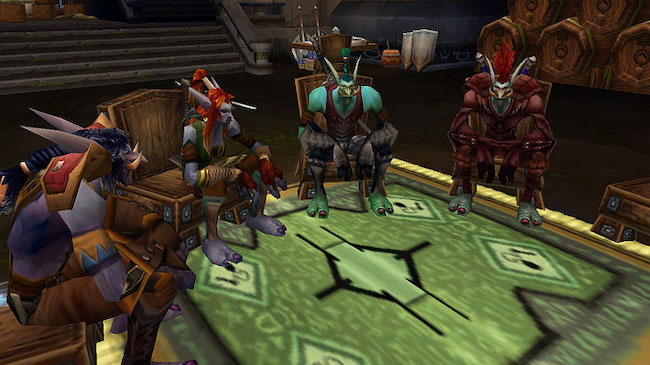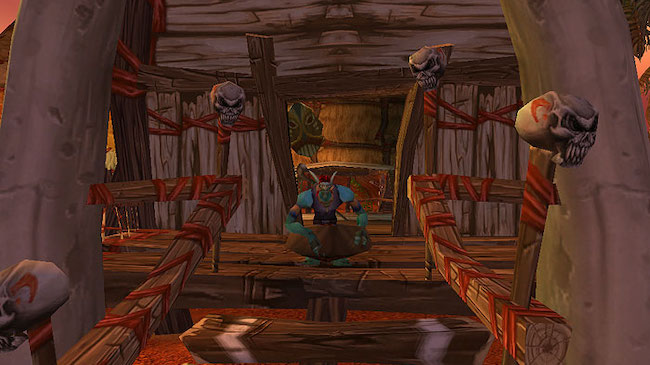The best WoW Classic professions to make quick cash
Which of the WoW Classic professions is best for your class?

WoW Classic professions are a great way to earn some extra in-game gold or create items, gear, and consumables that can be used while you're out questing or taking on some of the tougher endgame content. The release of Burning Crusade Classic also introduces the Jewelcrafting profession, so we've included details on that below.
Before you pick up any profession, it's worth doing a little research on what will benefit your particular class the most. Of course, if you're purely looking to make gold, this may not be such a big concern, but if you want your professions to help you through leveling, dungeons, and even raids, a little homework will save you time—and potentially, gold. Along with the new TBC Classic profession, here's everything you need to know about WoW Classic professions and how they can benefit you.
WoW Classic professions: What you need to know

WoW Burning Crusade Classic: everything we know
WoW Classic race guide: the best for your class
WoW Classic class guide: choose wisely
WoW Classic professions: make money fast
WoW Classic server: which to go for
Professions are split into two categories—primary and secondary. Primary professions are Alchemy, Blacksmithing, Enchanting, Engineering, Herbalism, Jewelcrafting (new in TBC), Leatherworking, Mining, Skinning, and Tailoring. You can only choose two primary professions per character so it's important you think carefully before making your choice.
Secondary professions are Cooking, Fishing, and First Aid. As you can learn all three on the same character, there are no choices to be made here, but it's a good idea to know the benefits of each before you put the time and effort into leveling them up.
All professions generally fall under one of two umbrellas: gathering or crafting. Gathering professions do exactly what you'd think—they enable you to collect crafting materials from various sources, whether that's Herbalism, Skinning, Mining, or Fishing. These materials are then used for the crafting professions, so pairing the correct ones can save you a ton of gold.
Conversely, if you're only interested in making gold, picking up two gathering professions is generally the way to go. Not everyone has time to farm the mats required to level crafting professions so you could see a tidy profit from the auction house.
The launch of Burning Crusade Classic sees some changes to how professions are learned. In WoW Classic, you have to visit the different levels of trainer to learn Journeyman (75), Expert (150), and so on—in TBC, you can learn 1-300 from any trainer in Azeroth, while TBC Classic profession trainers in Outland will take you beyond that. Aside from these changes—and the addition of Jewelcrafting—the professions remain largely unchanged between WoW Classic and TBC Classic.
Keep up to date with the most important stories and the best deals, as picked by the PC Gamer team.
So with the basics out of the way, here are all the WoW Classic professions, as well as the best combinations for each.
Alchemy

Alchemy is best paired with Herbalism. It's the practice of creating consumables that are typically often used when raiding or fighting against a particularly tough enemy. To make the potions, you need the right herbs which is why Herbalism is a great profession to learn alongside Alchemy.
Alchemy can produce flasks such as Flask of Supreme Power which lasts for 2 hours and provides increased damage for magic casters. It's also possible to create potions that boost resistance stats which are great for raids. Others include healing potions and DPS stat boosts, along with defensive improvements.
It can be an expensive profession further down the line because of the rarity of some of the herbs required, but it's a really useful one if you plan on raiding frequently.
While no race has a perk tied into Alchemy, Taurens benefit from an increase of 15 to their Herbalism stat which is very useful early on.
Blacksmithing
Blacksmithing helps you create powerful weapons and armour, so it's typically favoured by plate-wearing classes such as Paladins or Warriors. It also pairs well with the Mining gathering profession as you need substantial quantities of Ore to smith items.
All items need to be crafted at an anvil (typically available at major cities) and you need a Blacksmith Hammer to complete the work. Blacksmithing is another profession that can turn very expensive but early on, it's reasonably easy to improve.
Once you reach level 40 and skill level 200, you can choose to specialise as an Armoursmith or Weaponsmith. Such specialisms open up new recipes which can be useful if you're planning on kitting yourself out with new gear.
It's also possible to make useful items for non-plate wearing characters such as the Arcanite Skeleton Key which opens doors without rogues present.
Cooking

A secondary profession; you can train in Cooking without it affecting your primary choices. In World of Warcraft Classic, it's far more useful than it is in latter updates too. That's because it's convenient to have a steady supply of food that can restore your health and mana. You need a Cooking Fire to prepare the food but they're fairly easy to come by.
Some recipes are more fun than others, but soups such as Nightfin Soup are great for mana regeneration while there's Thistle Tea which boosts Rogue energy by 100. You'll be amazed how many different recipes are out there. Best of all? It's a relatively cheap profession as you can cook things from the items you gain when killing enemies.
Enchanting
Got some gear that feels like it could be enhanced? That's what Enchanting is for. You can use it to improve several gear slots permanently, boosting your stats substantially over time.
As well as that, Enchanters can disenchant other gear into dust so they can use said dust for better enchantments. It's a satisfying profession that requires special Rods to enchant gear. Predictably, that can cost a lot but the benefits are significant.
Typically, Enchanting pairs well with Tailoring as you can immediately make pretty nice pieces of gear, especially for caster classes which benefit a lot from enchantments.
It's also possible to craft wands and weapon oils, boosting the stats for a time.
Engineering

Engineering is a fairly quirky profession but it can be a lot of fun. Through it, you can build various gadgets and gizmos that have cool abilities tied to them. It's a particularly useful skill when you're a DPS class or you're interested in PvP combat. Many of the gadgets provide extra DPS or drain attacks such as the Arcane Bomb. There are also various tweaks that are perfect for the Hunter, such as extra scopes for their weapons and ammo that's extra powerful.
On top of that, there are some fun additions like fireworks and pets.
It's a particularly good profession to pursue if you're a Gnome, with the Engineering Specialization providing a 15 point boost to your Engineering ability.
I'm not convinced Engineering is the most profitable of options (unless you catch onto a gadget trend on your server), but it’s a lot of fun and ideal for sociable players.
First Aid
First Aid is a secondary profession that's invaluable to mostly everyone. It allows you to create bandages from many different types of cloth that are easily collectible while levelling up. Those bandages then heal you over a number of seconds. It's particularly useful if you're a Warrior or Rogue given the lack of innate healing capabilities, but pretty much anyone can benefit from some extra healing.
In addition to conventional healing, you can also use First Aid to create anti-venom bandages to cure poisoning effects.
There's simply no reason why you shouldn't give First Aid a shot. It's very useful, especially if you plan on soloing a lot.
Fishing

Fishing takes a lot of time but it's oddly soothing and relaxing. It's also a secondary profession so it's easy to tag onto your other skills. Simply use a Fishing Pole and bait next to a body of water and see what you can catch. The fish you find can be used to cook certain recipes, as well as be used in other professions.
Ultimately though, it's all about the fun that can be had from taking some time out of levelling or duelling. World of Warcraft also provides many fishing competitions which gives you all the more reason to get involved.
Herbalism
Herbalism is an ideal choice if you've rolled a Tauren as you gain a 15 skill bonus to it. It's also perfect if you're keen to dip into Alchemy given you'll need plenty of herbs to create potions. Herbalism also works well if you're keen to make money. Alchemists who don't want to do the hard work of gathering the herbs themselves are all too keen to purchase the items from the Auction House, and it's a huge way of making money fast.
Certain rare Herbs also go some way to boosting your bank balance, but expect to work for them.
If you're the kind of player who loves to explore and wander, without getting too bogged down with professions, then Herbalism is an easy one to maintain.
Jewelcrafting
Jewelcrafting is the new TBC Classic profession and allows you to craft rings, necklaces and trinkets, as well as giving you the ability to create gems to insert into socketed equipment. These gems come in different colours and offer different bonuses when inserted into gear.
This primary profession also grants you the 'Prospecting' skill which allows you to break down ore into gems and other materials. As such, it's a good idea to pair Jewelcrafting with Mining, though Alchemy shouldn't be discounted either, especially if you have another source for ore—Alchemy allows you to transmute gems for powerful Diamonds. The new Draenei class have a +5 Jewelcrafting skill racial, making them ideal for this profession.
Leatherworking

Leatherworking is commonly paired with Skinning, because it requires a lot of leather and scales to develop. Through Leatherworking, you can craft extensive gear that's ideal for Leather users such as Hunters, as well as Dragonscale gear for Mail users.
Like Blacksmithing, you're able to specialise at level 40 once you've reached 225 skill. There, you can focus on Elemental Leatherworking for agility users, or Dragonscale Leatherworking for mail users. There's also some powerful armour in the form of Devilsaur Armour that's great for DPS classes.
For a minor top up, players can also craft armour kits which boost the armour rating of all gear by a small amount. Ammo pouches can also be made making Leatherworking an attractive proposition for Hunters.
Mining
From a roleplaying perspective, Mining feels like a profession perfect for Dwarves, but there's more than one reason why it's a useful one to pursue. Much like Herbalism, it's highly profitable as you have to travel the world to find the best ore, as well as potentially smelt it in an anvil to turn it into bars for recipes.
If you're keen to be self-sufficient, Mining goes well with Engineering and Blacksmithing as the ore is required to craft many items for both. Along the way, you can also dig up special gems and stones which can be easily sold for a lot of gold.
For the roving adventurer keen to fill their bags with loot, Mining is an appealing idea.
Skinning

Skinning is the perfect accompaniment to Leatherworking as you'll need plenty of skins to be able to craft leather based armour. You'll need a skinning knife but these don't cost much to buy. Skinning ties in well with levelling up as you'll often find yourself killing beasts that can be skinned afterwards.
As a profitable profession, it's one of the best providing you have the spare room in your bags. Later on in the game, some skins you acquire can sell for a huge amount of gold. It's worth keeping it up to date if you're keen to profit rather than craft.
We're partial to a Leatherworking/Skinning Hunter as the combo works well, given you can craft your own gear.
Tailoring
Tailoring works well for casters, especially when paired with Enchanting. Tailoring is used to create cloth armour and cloaks, making it a very valuable profession for cloth only classes such as Mages and Warlocks.
Tailors can also create bags which are hugely helpful to gatherers and hoarders alike, as it's useful to be able to carry a lot of gear at once.
In the early days of World of Warcraft Classic in particular, expect bags to sell on the Auction House for a lot, making a Tailor a valuable choice. For the roleplaying enthusiast, they can also construct shirts and wedding dresses for added style.
For the Enchanter? Well, they can use Tailoring to convert cloth into tailored items before disenchanting them for extra dust and skillups, so it's a potent mix.

